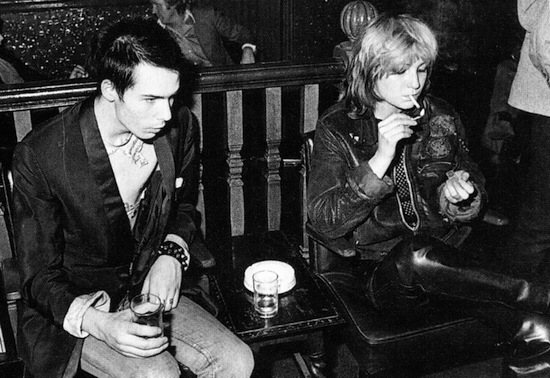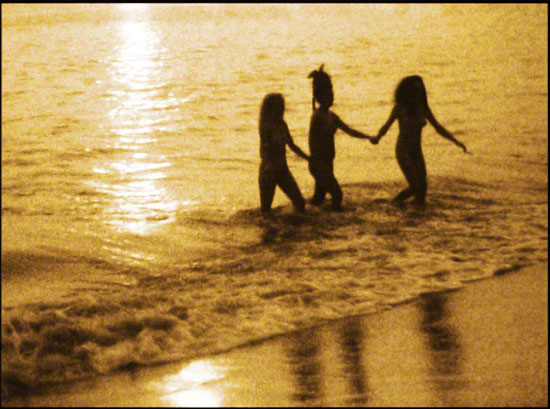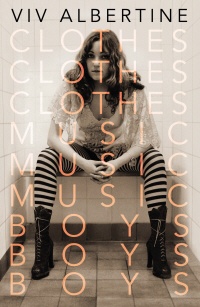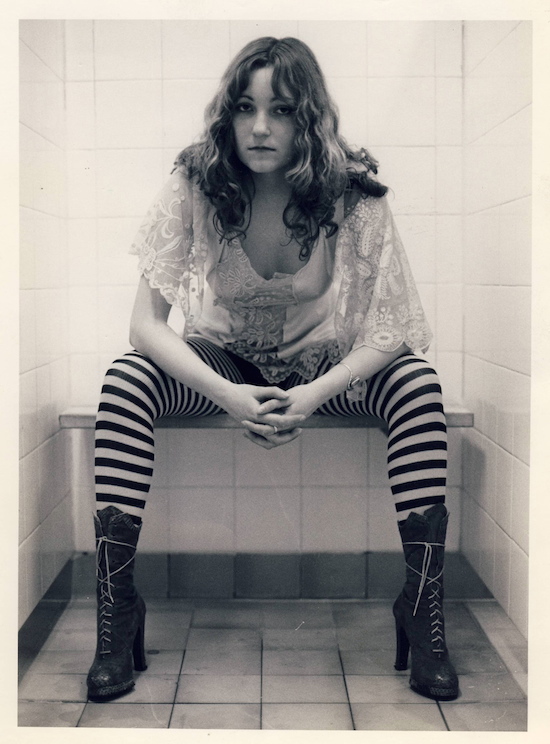Guts. There’s a whole lot of them in Viv Albertine’s new memoir, Clothes Clothes Clothes Music Music Music Boys Boys Boys. Figurative and literal, physical, emotional, and spiritual guts. From battling devastating health problems to working up the courage to re-teach herself how to play guitar and drive three hours each way to play two intimate songs at open mic nights twice a week, to saying ‘Yes’ to everything for a year, even if it’s a ‘yes’ to nothing. And there’s no shying away from body parts and functions. ‘When I came back,’ she tells me, ‘people were saying ‘oh, Viv Albertine…’ and I thought I’m gonna deconstruct this legend. I’m gonna pull it to pieces and show the loneliness behind it. The illness, the failures, and the mistakes behind what looks like a successful person. I think that’s more inspiring.’
Embodying the punk principles of self-expression, creating something new (a promise rarely fulfilled by the movement as a whole, with its overwhelming numbers of pop songs simply played at breakneck speeds), and the idea that anyone can do it, reading Viv’s struggles to forge her own life and style is indeed inspiring. Especially given the male-dominated climate of the era. ‘Never underestimate men’s fear of women’ a psychiatrist once told her when The Slits were having trouble with record companies, A&R men, and managers; a phrase she’s never forgotten. But punk is only the beginning of the story and, although most of that scene’s major players pop up, a small part at that. Life gets even more interesting post-Slits – her directing career (filming early live shows by Big Black and Butthole Surfers; Kate Beckinsale and Christopher Eccleston in their first film roles), complicated quest to become a mother, eventual return to music and start in acting. There’s plenty of sex, drugs, and rock n roll throughout to compete with any rock bio, but ‘Clothes Clothes Clothes…’ goes well beyond the narrow limitations of such a description. As Viv says, ‘I feel like it’s the journey of a woman. It could be any woman. But I’ve done so many things, I feel like any woman or man, boy or girl, could find something in there that resonates with them.’
I describe the book as ‘brutally intimate’. How did you find the whole experience of writing it?
Viv Albertine: Faber said to me ‘more than anything, what we’re interested in is the quality of the writing. It doesn’t matter what experiences you’ve had if the quality of your writing isn’t good’. I didn’t start off as a writer so I thought ‘bloody hell, I really have to raise my game to this challenge.’
I knew I was going to plan it around boys. I had a boy per chapter plan but of course things change when you start to write. I’d done about five chapters and it felt a bit homeworky. Then that thing happened where you find your voice on the page. And I felt all fired up inside and excited by the book. I now understand what they mean about finding the voice and the book becoming exhilarating to write. So I went back and wrote what I’d written again, partly because I was now writing in the present tense. I was writing as if it was happening to me – smelling it again, feeling it again – that was exciting. Because I’ve charted my life through clothes, music, and boys, it was easy for me to be back there, writing about things that have really made an impression on me. Sometimes they were little things, sometimes they were big things, but I could write in the present tense because each thing I wrote about was something that felt big at the time, something that’s never gone away.
In the end I thought ‘I’ll just sit here and write everything’. I’m just going to go all the way until I make myself cringe. And I can always go back and take it out. But of course those chapters were the most thrilling to write – I’d got so on the edge of going too far, saying too much. I read that Neil Gaiman once said in a lecture ‘when you feel terrified of what you’ve written and are asking if you’ve exposed too much of yourself, then you know you’re getting to where you should be going on the page.’ And I felt that a lot. Obviously. You can tell by the book. It’s quite a lot, especially for a woman. Women don’t really reveal themselves so much, (well they haven’t until now), all the bad, squelchy, awful stuff.
I liked the ‘if you fancy me, skip this bit’.
VA: (laughs) I thought ‘well, I’ll never get another boyfriend after writing this’ (laughs). But at the same time, I had to do it. Once I’d gone there, and I’d seen how powerful going all the way was, how can you start clawing it back from there? Once I’d committed it to the page, I couldn’t take it away again. I thought the book has to be at this level of honesty, otherwise what’s the point in writing it. That’s how the process of writing went.
And you hadn’t realised that when you started sketching it out.
VA: No, no no. I hadn’t realised the thrill, I hadn’t realised the fear, the embarrassment, the cringeworthiness. I hadn’t realised any of that, because I didn’t know what I was going to write, really. I’d think I’m going to write about that episode with that boy and of course I’m thinking I won’t go all the way – like the Johnny Rotten blowjob thing – I thought I’ll write about it for a laugh. I did make myself laugh quite often during it. I didn’t realise I was going to tell the whole truth but thought I’d put the whole truth down. Then I decided I’m not going to write it to be liked. It’s very tempting – in an interview, or writing a book, or whatever – to want to be liked. And I thought ‘I cannot write this as if I want to be liked. I’m going to have to make an absolute twat of myself, otherwise, again, it’s not worth doing.’
I’d quite like it to be a handbook that I would’ve liked to have read when I was a young girl. Seeing all the pitfalls. And therefore if a young girl makes a decision to take drugs or do this or that she might think ‘oh, there will be consequences’. Because she’s read someone who has done it before. Someone said it’s irresponsible because I’ve got a daughter of 15 but I don’t think it’s irresponsible because there are consequences to every bad thing I do. It’s not like saying ‘oh I did this and I had a great laugh’. There’s a price to pay every time.
Did you keep a diary at any point?
VA: No, no.
You mentioned writing in the present tense, some of it really read like diary entries–
VA: But that’s how burned into my brain and my emotions those things were. Occasionally where there was a date I had to look up, but apart from that there was no need for any research at all. It was all burnt into me. And in some ways, I may have remembered some things wrong. But it doesn’t really matter because memory is a fiction in so many ways – that’s how I remember it. Someone else in the same place and the same time might remember it very differently just because they were standing in a different spot (laughs). But it’s as truthful as I could be. Absolutely truth and it’s probably still not the truth really.
I love the title. But did you consider any others?
VA: (laughs hysterically) There was one, just for a joke. Blowjobs & Binbags. But I didn’t want it to be about punk. To me, that’s not an interesting story. There wasn’t enough there for me. And in some ways that was almost the most difficult section to write. So much happened then but there weren’t so many stand-out moments. (laughs) Actually when I did come to write it there were quite a few stand-out moments. But they were girly kind of things like Mick and me fighting on tour or a moment with Johnny Thunders or Johnny Rotten.

I really like all the epigrams at the beginnings of the chapters. It seems like you’re very well-read.
VA: Does it? (laughs) I’ve collected them for years. I did have quite a few that I wanted to use but then of course they didn’t fit the chapter after all. But some came really late, like ‘if you believe in me, I’ll believe in you’ which is from Alice In Wonderland, someone says it about the unicorn. That’s gone into the ‘Love’ chapter (laughs). Some came to me in the last two days but other things I’ve been hoarding for years which I wanted to use.
Who are your favourite authors and books?
VA: I was thinking of Proust when I was writing because he takes one moment like the madeleine moment and builds it up into twenty pages just tasting a madeleine, dipping it in tea. I felt my book had that. And in another moment he’ll write about a huge political thing or something gone wrong and I felt my book was very like that. Because it’s all these fragments of things, a friend said my subtitle could be ‘Madeleine Moments’.
Anaïs Nin is another one I read. She was unusual for being so honest about her sexuality and also a beautiful writer. Her books are all quite diarist-y in a way. Some are lyrical and slow and I think mine’s quite fast-paced. I want people to read it without trudging through. I just wrote the book I would’ve wanted to read.
There’s loads of other writers. Hofstadter. Again, taking a difficult subject and making it so readable. I’m a great believer in making yourself understood. Whether it’s art or lyrics or whatever. I’m always slightly suspicious of people who make their stuff very obscure. I think it hides someone who doesn’t really know what they’re on about. They’re either afraid to be unmasked or they actually don’t know what they’re on about. I like clarity very much.
Jean Cocteau’s Les Enfants Terribles. A universal portrait of a co-dependent relationship. The struggle for emotional power between two people. In the book it’s brother and sister but it resonates with me for couples too.
Gone Girl by Gillian Flynn. This time an extreme portrait of the power play within a marriage and how two people can become locked together like scorpions with neither one admitting defeat.
Are there any other autobiographies that you’re particularly fond of?
VA: Diana Athill’s, a sparky autobiography from a ninety year old. It’s good that people are recognising that older people have interesting things to say.
I’m With The Band by Pamela Des Barres. I was always fascinated by girls who mixed with musicians because I couldn’t imagine any other way to be in that world other than by being a girlfriend, groupie, backing singer, or diva. I had no role models. I knew people who knew Pamela so would hear things about her and be very interested in what she was up to. In a way, the GTOs were one of the first girl bands. None of them played instruments but the fact they were linked to Frank Zappa meant you could take them a bit seriously.
Aftermath by Rachel Cusk. A brutally honest and poetic portrait of separation. Jeanette Winterson’s Why Be Happy When You Can Be Normal? Insightful, so much you can learn from her.
I read loads during the three years I was writing, ate books up. This is just a small selection. But I don’t think they influenced me at all. I was more influenced by the odd thing I’d hear a writer say like Hilary Mantel saying ‘Write in the present moment as if you don’t know what’s coming next’. I’m sure she’s talking about fiction but I thought that would apply to me. I’d have to have the nerve to look like an idiot. I wanted people to think ‘what the fuck is she doing? What an idiot.’ And be able to take that criticism. Because that’s what happens in real life. You don’t know what’s coming next. And I took that from Hilary Mantel.
Has anything changed for you since you’ve written it?
VA: People keep asking was it cathartic? And I say no. It was like going through a loft of an old house that you’ve lived in for 15 years. It was agony, it was painful, it was so upsetting and I didn’t feel in the least bit cleansed by the end of it. Instead of feeling transformed, it dribbled on and on and on and on. It’s just hard work and it was emotionally hard work. But I did notice, in the earlier drafts, there were quite a few moments where I felt angry with this or that person in life and I wrote that down and sort of got back at them kind of thing. And as I redrafted and redrafted, which I did a hell of a lot, that all went away. And I started to realise that the trajectory was about a woman’s survival and it wasn’t about the little upsets along the way where someone had done me wrong. So I think that healed me quite a lot. Those little vendettas and angers I had towards people, they’ve gone now.
I was amazed how you were able to write about being in love with your husband when writing about the beginning of your marriage, having just recently gone through a divorce.
VA: Well again, that’s because I wrote in the present tense and I transported myself back there. And it was very vivid, as falling in love is. And also the fact that I’ve got a daughter by him, it was important for me that she knows she came from love, a great love.
Did you have any big realisations while you were writing it? I noticed a big belief in intuition coming through.
VA: Oh that’s good, yeah. I think intuition is sometimes all you’ve got in life. And if you’ve got the nerve to listen to it, it will get you out of a lot of scrapes. Sometimes it’s just a tiny little voice and I don’t think we’re taught to listen to our intuition or build it up. It should be massive in us. It will get you more than any GCSEs, exams, or whatever. It will get you further if you listen to that.
I think of it like surfing. If you’re surfing a wave you’ll shift your weight, you’ve gotta act on the moment. I think that’s what life is. The great thing about being single is that you can surf life exactly to suit your own rhythms. These last five years I’ve achieved so much, I’ve shocked myself. I know when you’ve been in long relationships it’s not to do with the person so much as the nature of the relationship. I see it in couples all around me. I just wish if our intuition was built up more and we’d be used to that, we could be in partnerships more without dragging each other down. That would be great.
I do feel my intuition is stronger. I’m much more confident of that and I’m teaching my daughter to follow hers. Imagine if we were taught that from very young. I even say to her now, ‘trust the path you’ve chosen, the friends you’ve chosen’.
I wanted to talk about coincidences as well as intuition. Like Patti Smith walking into the Japanese restaurant you were at with Vincent Gallo, just as you were realising you needed to get on with your life.
VA: I think coincidences are more likely to happen if you’re working fucking hard at your life. And you’re keeping yourself mentally, physically, and emotionally fit. And then you’re in places at the time you should be there. Coincidences and luck are very much down to the work you put into yourself in life.
Vincent coming into my life at that moment, the timing was amazing. If it had been a month before or afterwards, it probably wouldn’t have had the impact it did. But it was bang on. I was just beginning to emerge, going to art school, healing from all the illness, moving to the sea. It was just right. So that coincidence came. I grabbed onto that and didn’t let it go. I saw him as almost a lifeline. Whatever it was that came along had to be a certain mixture of things, otherwise I wouldn’t have been interested in grabbing onto that lifeline. But this was big enough, and out of my sphere enough, that I was absolutely taken by the whole thing. But if I hadn’t looked after myself, got myself better, been running, gone to art school, I wouldn’t have been ready for that. I know other people who have had things drop into their life and they’re not ready to take it. And Patti Smith walking in then – if I hadn’t taken a trip to New York, if I hadn’t worked on myself, if I hadn’t believed this was something coming along to show me I could do more, then I wouldn’t have been sitting in that café and seen her come in that time.
So yeah, I think coincidences very much have a lot of work behind them. And if you’re not fit, you can’t benefit from them.
Robert Anton Wilson said that when you’re going through times of great brain change is when you tend to notice the most coincidences.
VA: Well that would definitely fit with the state I was in. And then my intuition would let me grab those things and make something of them. A bit like my ‘Year of Saying Yes’. Instead of just thinking ‘oh, that’s a coincidence, it doesn’t mean anything’, I’d grab it and run. And it led on and on and on to working with this person or recording with that person. They all lead, the ball just didn’t stop rolling. It was incredible.

How do you feel about water? I notice a lot of your analogies have to do with water.
VA: I had an amazing water section in the book which was too exotic to keep in with the conversational style. There was this really trippy moment about getting lost and drowning in a muddy lake. It didn’t fit in the end but it was within the Vincent section, where it began to occur to me that it was all a bit of an illusion and that there wasn’t going to be a conventional outcome. I couldn’t write about it too literally, it came out in this metaphor of drowning in tumbled up weeds. And I came out unrecognisable, because of all the mud and the plants and everything. It was scary and very disorientating. I came out somewhere else but at the same time I was cleansed and different. I’d come up on the other side from my old life, which I saw over there.
I don’t know why I always think of water. I wouldn’t think I was particularly a water person. I’m probably more fire (laughs).
In your ‘Year Of Saying Yes’, I thought your ‘saying yes to nothing’ was an interesting way of saying ‘no’. A positive way to look at it.
VA: I still say I’ve got two choices. It might be someone saying ‘oh, be with me, we’ll live this sort of life’. And I think ‘eh, it’s really not right’. And my alternative is nothing. Nothing, just a void. It’s so frightening. We’re not taught to go for the void. Let’s go for the nothing. Step off the edge there and just fall. So I had to teach myself to just keep stepping off into the void…into nothing.
With this book, it will be interesting to see what life brings back. I’m just hoping if you’re honest, it brings back something equal to being honest. I do find being honest is very cleansing. People can’t stay around you if they’re false people. And sometimes it can be quite lonely, and you can have moments or months when you’re changing direction. Saying yes to nothing rather than the wrong thing. There will be fallow periods, where you’ll have to wade – again watery metaphor – through. Sometimes you don’t know what you’re doing and you just have to get on with the day to day stuff.
I had to have that fallow time to have my child and recover from illness anyway. Those hard times are probably the most creative of all. Make the best chapters. The bad boys always make the best chapters I always say (laughs). Absolutely. From the IVF I got the most wonderful child. If I hadn’t gone through all that, it wouldn’t have been her. Through all the cancer, I had been made a better person. I have more empathy, I’m more connected to the world because of all that, definitely. The hardest times have produced the best results. If you get through. (laughs)

Clothes, Clothes, Clothes. Music, Music, Music. Boys, Boys, Boys. is out now, published by Faber & Faber


